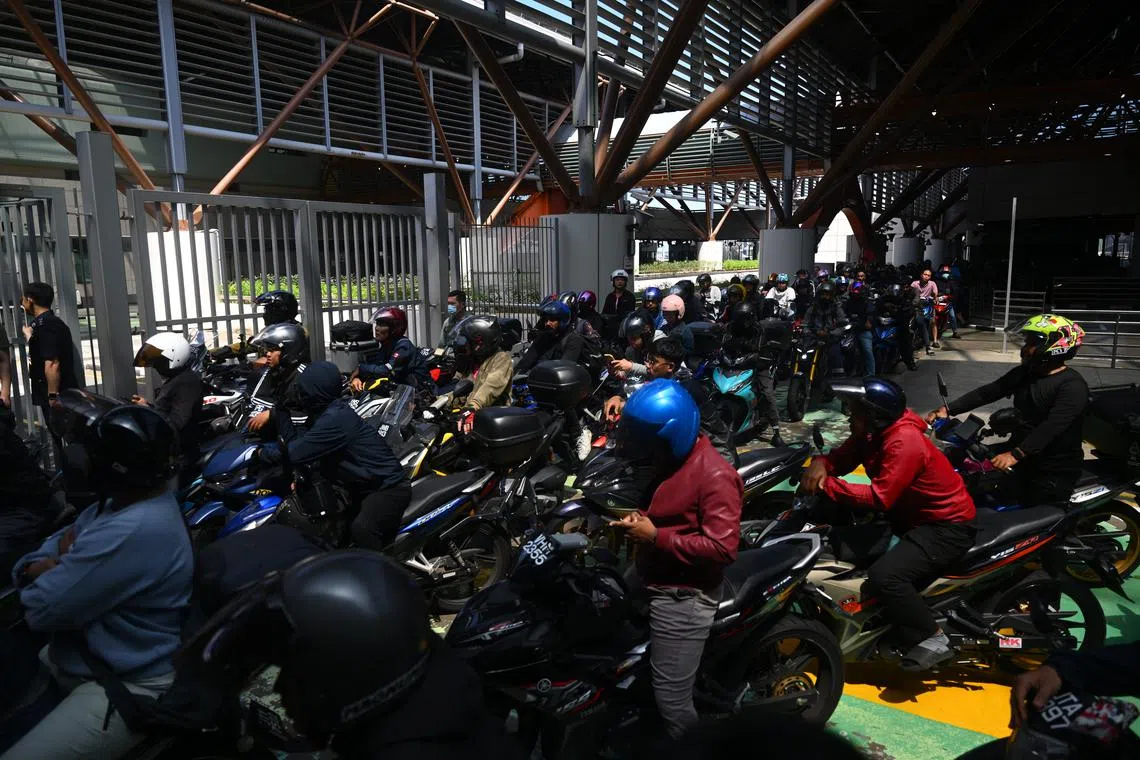More approved motorcycle helmets to be available in Singapore from Nov 1
Sign up now: Get ST's newsletters delivered to your inbox

Besides a wider variety of helmets, prices may also come down due to lower compliance costs.
ST PHOTO: AZMI ATHNI
Follow topic:
SINGAPORE – From Nov 1, motorcyclists can expect a wider variety of helmets at potentially lower prices in Singapore, owing to updated requirements.
The latest requirements are aligned with the internationally recognised standards. This means that helmets made to these standards will be able to be used in Singapore. Certain helmets certified overseas to these requirements can be sold here without having to undergo any approval processes, while others will need to be tested locally before being certified.
The labelling for approved helmets in Singapore will also be changed. In their statement announcing the changes issued on Sept 9, the Traffic Police said the update “will lead to a wider variety of approved helmets being sold in the market and lower the cost of helmets”.
Currently, only one laboratory in Singapore is approved to certify motorcycle helmets under the outgoing standards. With the update, more laboratories will be accredited to do the testing, speeding up the process.
The regulation under the United Nations Economic Commission for Europe (UNECE) safety standards, known as UNECE R22.06, will be recognised in Singapore. Helmets that are certified to this standard can be sold in Singapore without the need for testing.
The standards Singapore is adopting are internationally recognised and already in use in the European Union, the United Kingdom, Japan and South Korea, the Traffic Police said. They include rotational impact protection, enhanced field of vision requirements and high-speed impact absorption, which the police said are critical qualities in mitigating the impact of motorcycle accidents.
Between Nov 1, 2025, and Nov 18, 2026, certification under the old standards will still be accepted as part of the transition.
Helmets approved under the outgoing standards will not be allowed to be sold from Nov 19, 2031.
The new labels to identify locally approved helmets will show details including the certification laboratory and the year of the test. The certifications are valid for five years from the date of testing.
Motorcyclists are not required to immediately replace their current helmets which have been certified under the old standards. But the Traffic Police advise riders to replace their helmets after five years, even if they appear to be in good condition as the construction materials degrade with use and exposure to weather and sweat.
The standards were last updated in 2014. Importers have said that because the 2014 requirements were different from recognised standards adopted in places such as Europe or the US, there was always a risk helmets approved elsewhere may not pass tests here.
In addition, the 2014 standards involve destructive testing, which increases the cost of making helmets available in Singapore. Also, owing to the design of the standards, helmets with chin straps equipped with quick-release mechanisms tend to fail the test.
Quick-release mechanisms latch like the seat-belt buckle in cars, making them more convenient to use than having to thread the helmet’s chin strap through two D-shaped metal rings.
Motorcyclists say the inconvenience also means that some riders may not latch their chin straps securely, undermining the helmet’s effectiveness in protecting the rider.
The latest statement comes nearly 11 months after the revision to the existing standards governing motorcycle helmet safety was announced at a mass motorcycle event on Oct 19, 2024. Back then, it was expected that under the revised standards, all helmets to be sold in Singapore would still have to be subjected to testing.
Mr Rex Tan, president of the Singapore Motor Cycle Trade Association, expects the variety of helmets available to riders here to increase from Nov 1 as a wide array of existing options already comply with the new standards.
Mr Tan, who was part of the working group tasked with reviewing the standards for motorcycle helmets, said he was surprised that testing would not be needed for helmets certified under UNECE R22.06, but noted this practice has been adopted by other countries.
With the removal of the testing requirement, he expects sellers to review their pricing to reflect the lower compliance cost.

